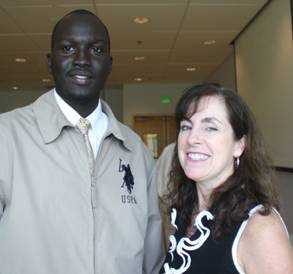Friday, October 14, 2011

Exporting Democracy
PRINCESS ANNE, MD-(October 14, 2011) The University of Maryland Eastern Shore had a key role earlier this year introducing the concept of voting in a referendum to citizens of southern Sudan.
Angela Stephens, a UMES Development Outreach and Communications officer, visited campus last week to share personal stories of her front-line activities in the war-torn east African nation.
Stephens, a former journalist assigned to the U.S. Agency for International Development, a UMES outreach partner, worked alongside voting rights groups to organize a referendum in mid-January. At issue was whether residents in the equatorial regions of Sudan supported forming a country separate from those living in the north.
Organizers had to overcome widespread illiteracy and a lack of infrastructure that define the term “third world,” Stephens told a gathering of 60 or so at the Student Services Center. Slightly more than one in four people in southern Sudan can read, electricity is virtually non-existent and the few roads that connect far-flung villages are difficult to traverse, she said.
Items as simple as pens and rubber bands don’t exist. Everything needed to stage a referendum, including portable generators to run tabulations machines, had to be brought in.
Nonetheless, four million people from the region voted overwhelmingly – 99 percent – to form a new nation, South Sudan.
“That was a very satisfying thing,” Stephens said. “That’s clear-cut. There’s no denying the will of the people. Nobody could question the outcome”
Stephens’ presentation included a 15-minute film shot by amateur videographers, who chronicled the struggle to organize the vote. Among those appearing in interviews were former President Jimmy Carter and Kofi Annan, the former United Nations Secretary General.
Now, Stephens told her UMES audience, the difficult part of nation-building begins. A big issue that needs to be resolved is oil; the south has the reserves, but the north has the infrastructure to move it to market.
Stephens said aid organizations are focused on helping the people of the new nation modernize their ability to raise and market crops, an area of expertise UMES has been involved in exporting for four decades.
“This new country faces huge challenges,” Stephens said.
Photo caption: Aweng T. Maduot-Parek, a senior agriculture major from Sudan, was among those who attended a Sept. 27 presentation on campus by Angela Stephens, a UMES Development Outreach and Communications officer who has worked in Africa.
2011 International Development Lecture Series
Sept. 29 Angela Stephens “Communicating USAID Foreign Assistance to the U.S. Public, Media and Congress”
Oct. 6 Gary Imhoff “Building Nationhood: An Overview of USAID’s Support to the New Nation of South Sudan”
Oct. 11 Dr. Julie March “Conservation Agriculture-Challenges and Promise for Chronically Food Insecure Areas”
Oct. 13 Charles Setchell “Your International Humanitarian Shelter Dollars at Work: An Overview of USAID/OFDA She

